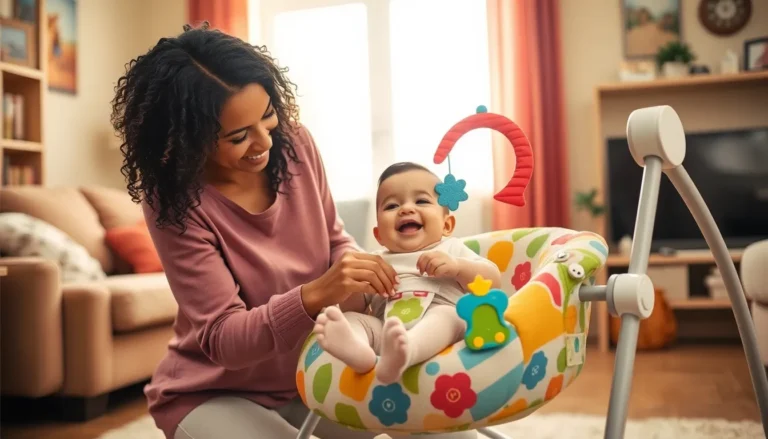Every parent knows that raising kids can feel like a rollercoaster ride—thrilling, unpredictable, and occasionally enough to make you want to scream. When tempers flare and voices rise, it’s often in the heat of the moment that parents find themselves yelling at their children. But is this really the best approach?
While it might feel satisfying to let out that pent-up frustration, the long-term effects of yelling can be more damaging than one might think. Picture this: a child who learns to associate love with raised voices, or a parent who feels guilty after every outburst. This article dives into the comedy and chaos of parenting, exploring why yelling might be the loudest mistake they make and offering tips to turn down the volume on family life.
Table of Contents
ToggleUnderstanding Parent Yelling at Child
Parent yelling often occurs in stressful situations and can stem from various emotional triggers. Understanding this behavior helps in addressing underlying issues.
Definition of Yelling
Yelling refers to raising one’s voice loudly, often as a means of expressing anger or frustration. This behavior typically emerges during conflicts or when trying to gain attention quickly. Parents may not realize the impact of their tone, but children often respond to it emotionally. Raised voices can convey urgency, but they also instill fear and anxiety in children. Experts stress the importance of recognizing yelling as a harmful communication method that may foster negative associations with love and safety.
Reasons Behind Parent Yelling
Stressful circumstances often lead to yelling. Parents can feel overwhelmed with responsibilities, causing their emotions to escalate. Lack of effective communication skills might result in frustration and subsequent outbursts. Children’s behavior may trigger a parent’s yelling when they don’t listen or follow instructions. Peer pressure and external stresses, such as job-related issues, can compound existing tensions. Cultural background may also play a role; some environments normalize yelling as a disciplinary method. Understanding these reasons can facilitate conversations about healthier discipline strategies.
Effects of Parent Yelling on Children
Parent yelling affects children significantly, influencing both their emotional well-being and behavior. Understanding these effects can aid in fostering a calmer family environment.
Emotional Impact
Yelling creates an environment filled with fear and anxiety. Children exposed to raised voices often develop a skewed perception of love, associating affection with anger. Emotional distress may emerge, leading to feelings of worthlessness and low self-esteem. Increased aggression can be a direct response, as children learn to mimic what they observe. Many children withdraw and become less communicative, further isolating themselves from parental figures. Psychological research suggests that prolonged exposure to yelling contributes to anxiety disorders and depression later in life.
Behavioral Consequences
Yelling often leads to immediate behavioral changes in children. They might exhibit heightened defiance and aggression in response to the anger directed at them. Communication breakdown becomes common, as children find it difficult to express their feelings constructively. Some may resort to lying or avoiding situations that provoke anger, impacting trust in parental relationships. Academic performance may also decline, as anxiety interferes with concentration and focus in school settings. Over time, children raised in environments where yelling is prevalent may employ those same habits in their own future relationships.
Alternatives to Yelling
Exploring non-yelling approaches fosters healthier interactions and reduces stress in a household. Implementing effective strategies can create a more supportive environment for both parents and children.
Effective Communication Techniques
Active listening strengthens parent-child connections. Parents can encourage children to express their feelings openly, validating their emotions. Using a calm tone promotes understanding during conflicts. Encouraging dialogue allows children to share their perspectives, fostering empathy. Additionally, asking open-ended questions can guide children in problem-solving, enhancing their communication skills.
Positive Discipline Strategies
Utilizing positive discipline can establish clear expectations. Setting specific, achievable goals helps children understand desired behaviors. Reinforcing positive actions with praise encourages them to repeat those behaviors. Offering choices empowers children, granting them a sense of control in their decisions. Creating routines provides structure and predictability, reducing the likelihood of conflicts.
Seeking Help and Support
Seeking help and support can play a crucial role in managing the challenges of parenting. Various options exist for parents to address their concerns effectively.
Counseling Options for Parents
Counseling provides a safe space for parents to express their feelings and explore underlying issues. Individual therapy focuses on personal triggers and emotional resilience. Family therapy fosters unity, enhancing communication skills and family dynamics. Group therapy connects parents facing similar challenges, building a supportive community. Professional guidance assists in establishing healthier disciplinary strategies, ultimately reducing instances of yelling.
Resources for Families
Numerous resources offer valuable support to families. Parenting classes educate on effective communication and discipline techniques. Online forums create platforms for sharing experiences and advice with other parents. Books covering emotional intelligence and stress management provide insights into navigating parenting challenges. Additionally, local support groups connect parents to community resources, fostering a network to rely on in difficult times. Utilizing these resources strengthens family bonds and promotes a more peaceful household.
Parenting is undoubtedly a challenging journey filled with ups and downs. Recognizing the impact of yelling on children is crucial for fostering a nurturing environment. By embracing alternative communication strategies and seeking support, parents can break the cycle of yelling and cultivate healthier relationships with their children. It’s essential to prioritize emotional well-being and create a space where children feel safe and valued. With patience and commitment, families can transform their dynamics and promote a more peaceful atmosphere at home.



